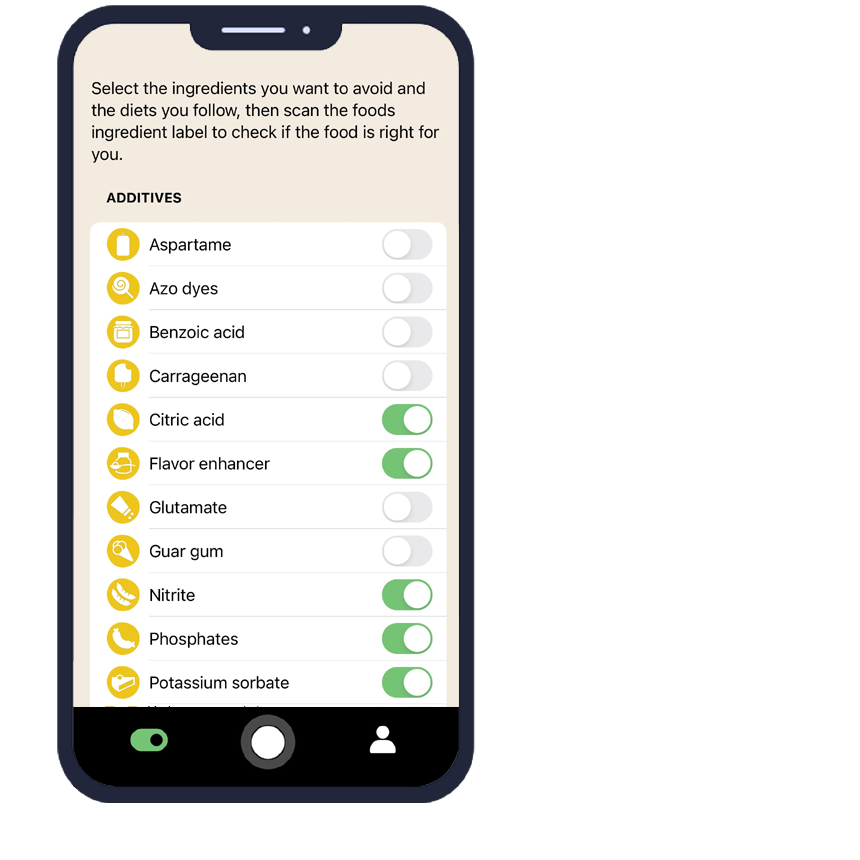Everything You Need to Know About Sweetener and How AI Eat This Can Help
Sweetener is a broad category of food additives used to enhance the taste of countless products we consume daily. Whether you're managing dietary restrictions, dealing with food allergies, or simply trying to make healthier choices, understanding what Sweetener means on ingredient labels is crucial. The AI Eat This mobile app revolutionizes how consumers identify and avoid unwanted ingredients by scanning food labels in any language, making it easier than ever to maintain your preferred diet.
What Is Sweetener and Where Is It Used?
Sweetener refers to various substances added to foods and beverages to provide sweetness without the calories of traditional sugar. These food additives include artificial sweeteners like aspartame, sucralose, and saccharin, as well as natural alternatives like stevia and monk fruit extract. Sweetener compounds are regulated by health authorities worldwide and often appear on labels with specific E-numbers in European markets.
The food industry relies heavily on Sweetener to create low-calorie and sugar-free products. You'll commonly find these additives in diet sodas, sugar-free gum, light yogurts, protein bars, and countless processed foods marketed as "healthy" alternatives.
Common Foods Containing Sweetener
- Diet and zero-calorie beverages
- Sugar-free candies and chewing gum
- Low-calorie desserts and ice cream
- Protein powders and meal replacement shakes
- Sugar-free syrups and condiments
- Diet baked goods and snack foods
Is Sweetener Safe? What Does the Research Say?
Major health authorities including the FDA, EFSA, and WHO have extensively studied artificial sweeteners and established acceptable daily intake levels. These organizations consistently affirm that approved Sweetener additives are safe for general consumption when used within recommended limits.
The FDA has approved several artificial sweeteners after rigorous testing, including aspartame, acesulfame potassium, and sucralose. Similarly, the European Food Safety Authority regularly reviews scientific evidence and maintains strict safety standards for all approved Sweetener compounds used in food products.
Regulatory Approvals and Guidelines
Each approved Sweetener undergoes comprehensive safety testing before reaching the market. Regulatory bodies establish Acceptable Daily Intake (ADI) levels, which represent amounts that can be consumed daily over a lifetime without health risks. These guidelines are set with significant safety margins, typically 100 times below levels that might cause adverse effects in animal studies.
Risks for Specific Groups
While generally safe, certain individuals may experience Sweetener intolerance or need to avoid specific types. People with phenylketonuria (PKU) must avoid aspartame, as it contains phenylalanine. Some individuals report digestive issues or headaches from certain artificial sweeteners, though scientific evidence for widespread Sweetener allergy remains limited.
How to Use AI Eat This to Avoid Sweetener
The AI Eat This app transforms ingredient identification from a tedious task into a simple scan. Using advanced artificial intelligence, the app instantly recognizes Sweetener and other additives in ingredient lists, regardless of language or complex chemical names. Users can set personalized dietary filters to automatically flag products containing unwanted ingredients.
Simply point your phone's camera at any ingredient label, and AI Eat This will highlight Sweetener compounds in real-time. The app's database includes thousands of alternative names and E-numbers, ensuring you never miss hidden additives. This technology is particularly valuable for people managing dietary restrictions who need to avoid specific Sweetener types.
The app's personalized filtering system allows users to create custom profiles based on their specific needs. Whether you're avoiding all artificial sweeteners or just certain types, AI Eat This adapts to your requirements and provides instant feedback on product suitability.
Who Should Avoid Sweetener?
Several groups may benefit from limiting or avoiding Sweetener consumption. Individuals with phenylketonuria must strictly avoid aspartame-containing products due to their inability to process phenylalanine properly. Some people experience digestive sensitivity to sugar alcohols like sorbitol and xylitol, which can cause bloating and gastrointestinal discomfort.
Parents may choose to limit their children's exposure to artificial sweeteners, preferring natural alternatives or simply reducing overall sweetness in their family's diet. People following certain dietary philosophies, such as clean eating or whole food approaches, often prefer to avoid processed Sweetener additives entirely.
Those managing diabetes should work with healthcare providers to determine appropriate Sweetener use, as individual responses can vary. While artificial sweeteners don't directly raise blood sugar, some research suggests they may affect gut bacteria and glucose metabolism in sensitive individuals.
Tips for a Sweetener-Free Diet
Adopting a diet free from artificial Sweetener requires careful label reading and strategic food choices. Focus on whole, unprocessed foods that naturally contain no additives. Fresh fruits provide natural sweetness along with beneficial nutrients, fiber, and antioxidants.
When shopping for packaged foods, use AI Eat This to quickly scan ingredient lists and identify hidden Sweetener compounds. Many products marketed as "natural" or "healthy" still contain artificial sweeteners, making ingredient scanning essential for maintaining dietary restrictions.
Gradually reduce your overall preference for sweet tastes by slowly decreasing sweetener use in coffee, tea, and homemade foods. Your taste buds will adapt over time, making naturally sweet foods more satisfying and reducing cravings for artificially sweetened products.
Experiment with natural flavor enhancers like vanilla extract, cinnamon, or citrus zest to add complexity to foods without relying on Sweetener additives. These alternatives provide flavor depth while supporting your goal of avoiding processed ingredients.
Conclusion
Understanding Sweetener and its presence in modern food products empowers consumers to make informed dietary choices. Whether you're managing specific health conditions, following dietary restrictions, or simply prefer to avoid artificial additives, knowledge is your best tool. The AI Eat This app bridges the gap between complex ingredient labels and consumer understanding, making it easier than ever to maintain your preferred diet. Download AI Eat This for free testing today and take control of your food choices with confidence!

70 filters
With over 70 filters, you can easily avoid certain ingredients and follow your dietary preference.

Paleo

Pescetarian

Ultra-processed food

Vegan







































































